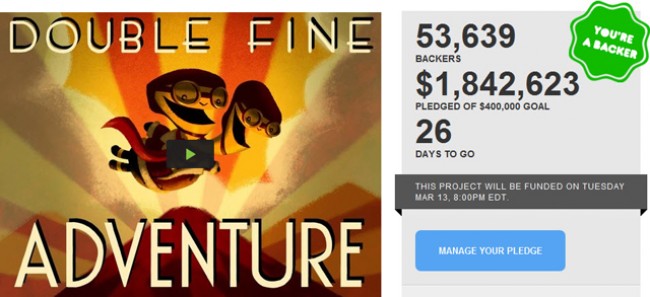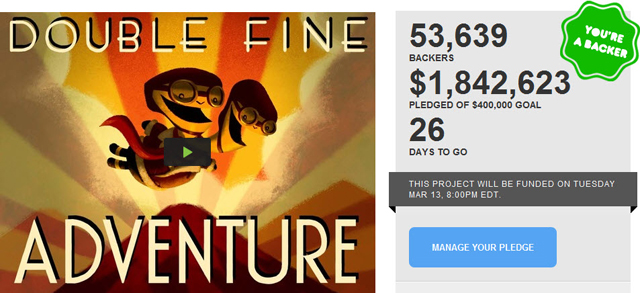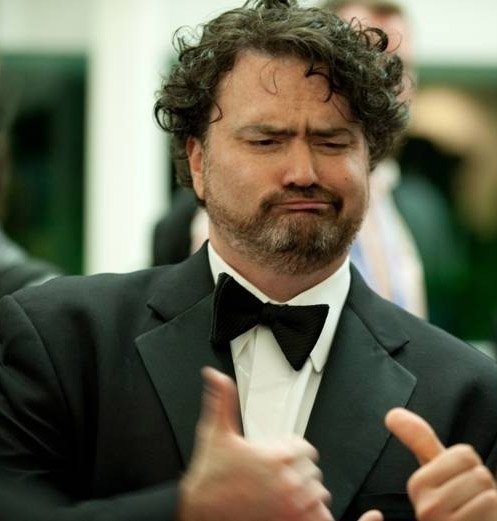South Africa’s retail forex industry is entering a decisive phase as regulation tightens and consolidation accelerates. What does it mean for brokers and traders?
Kickstarting a Double Fine Adventure

The most successful Kickstarter pledge is under way — happening right now folks. And what a pledge it is — the promise of an original adventure game, a fringe genre by today’s standards — backed by you and me, the fans. Could this be a new direction for gaming publishing forever?
Probably not, but it does send a message to big publishers – that there are alternatives to getting funded and distributed, so what are you gonna do about it? And that is the question everyone should be asking: how will the middle men of the gaming industry adapt?
The Big Picture
For those not following one of the hottest internet stories at the moment it goes a little something like this:
Legendary game designer Tim Schafer (Day of the Tentacle, Grim Fandango) known for his original storytelling and great, humourous writing in games, specifically that genre – point and click adventure games – made a pledge on the famous Kickstarter website. Famous for its crowd-sourced funding of creative projects, mainly independent, Kickstarter had never had a big studio-endorsed project (or game) on its platform before now.
Schafer’s idea behind the pledge was based on the notion that publishers wouldn’t risk money on the graphic adventure genre or any ‘risky’ creative projects, so why not go direct for funding. With Steam (digital distribution), a reputed team (Double Fine) and the Tim Schafer/Gilbert names behind the project, all that was left was the money. But where could they get that money? Well the people who would want the game made of course: the fans.
And so the pledge began, on the eighth of February to be precise. Give us $300 000 to make the game and an extra $100,000 to document that process and we’ll give you a series of tiers of rewards. The bottom tier being the actual game, beta access through Steam, exclusive community access, and a producer credit in the game. The upper echelons will fetch you signed posters, original artwork (of your face if you’re willing to pay the price) and one lucky $10,000 backer will even wine and dine with Tim Schafer himself. Hopefully he’ll get the tip.
Check out the Kickstarter pledge to have a look for yourself. Achieving the goal of $400,000 in a mere 8 hours, the pledge passed the $1 Million mark in 24 hours. It is officially the most successful Kickstarter project ever. And it’s still going.
The Fine Print
There are a few factors that have to be taken into account when looking at this crowd-sourced-funding phenomenon: Tim Schafer being an established name in the industry already, having the team in place to make the game, and the distribution taken care of already via Steam’s ever impressive platform. Could this pledge be replicated? I don’t think so. While Kickstarter and Steam alone provide alternative and viable options for indie developers to get their Magnum opus’s made, the amount of money that the Double Fine Adventure pledge garnered is surely a one of a kind, at least for the foreseeable future.
What it does prove though is that big ticket publishers are not the be-all and end-all of the gaming industry, or any creative industry for that matter. Indeed independent film, comics and applications have had great success via the Kickstarter platform. Publishers should put their ears up, and perhaps even stand to attention. They should think about what the fans want, and just what lengths those fans will go to, to get an original game.
There is definitely still a place for big ticket publishers, just as big Hollywood studios will still thrive thanks to one or two blockbusters per year, say a Transformers or Harry Potter movie. The rest of the bunch just has to break even. Likewise a Modern Warfare will keep the gaming publisher-clock ticking. That’s all it needs.
But with this model comes the problem of ‘low risk’ taking. Studios will put a lot of money on the line, if it’s guaranteed to make them a three-fold return. This means sequels upon three-quels upon adaptations of vampire books. And as Schafer stated: the ‘risk taking’ is low. And that is understandable. But the fans want something else, and luckily this pledge alone is getting enough attention to prove that.
The irony of it all is that with 50,000 odd backers (and counting), averaging at around $35 per pledge at the date of writing, the game would be considered a flop if they were standard sales via the traditional publishing method. 50 000 units is a small number. It is more the pay-what-you-want model that is incorporated in the Kickstarter method that makes it successful. Made famous by the band Radiohead with their album In Rainbows back in 2007, it proved then that publishers weren’t necessary (or music labels in that case). With some backers contributing as much as $10 000 it doesn’t matter if you only have 50 000 sales, you’re still going to get the funds you need, and most likely more.
It is where those 50 000 backers’ money is going that seems to encourage some people to donate far more than your average $50 for a big gaming release. It’s like pre-ordering the game, but instead you’re getting a tangible reward in the form of the game and tons of bonus features. But you’re also guaranteed that the money goes to the developers and (hopefully) to the development of the game you are buying.
There is no such guarantee from publishers like EA and Ubisoft. And maybe that’s why it appeals to the fans. It’s more active, more exclusive (publishers aren’t invited) and there’s something quite romantic about that.
The publishers have to ask themselves, are they giving fans what they want? They need to work out how they can fit into this new model, or find a way to compete against it effectively because, as the Double Fine Adventure pledge proves, they are not necessary for creative projects to thrive. Regardless, crowd-sourcing and direct funding is on the map, we’ve noticed and so should they.
And let’s not forget, we’re getting a new Schafer/Gilbert adventure while making the point, and just look how happy that makes the man.


